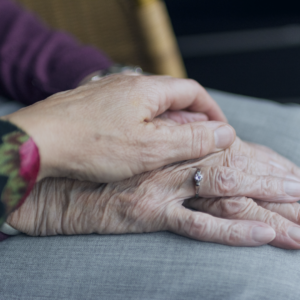Behavior and Communication Changes in those Living with AD
Whether you are a family member or caregiving professional, caring for someone that struggles with Alzheimer’s disease or another form of dementia can be a long and stressful journey. According to the Alzheimer’s Association, more than five million Americans are living with Alzheimer’s disease and as your loved one’s dementia progresses, you may notice a change in behavior and communication.
Behavioral Change
Because Alzheimer’s causes brain cells to die, this may affect how a person living with memory loss behaves. Here are a few common behavioral changes you may notice in your loved one:
- Becoming angered or worried more easily.

- Showing minimal interest in activities they used to enjoy.
- Hiding things or believing other people are hiding things.
- Imagining scenarios that did not happen or things that are not there.
- Pacing more frequently.
- Wandering away from home.
- Becoming aggressive with caregivers, friends, or family.
- Misunderstanding what he/she hears or sees.
Although caregivers are not able to stop the behavioral changes in someone struggling with Alzheimer’s, there are ways to cope with it such as creating a daily routine or engaging in at-home activities.
Communication Changes
Communicating with someone with Alzheimer’s can be troubling to some. Whether you, as a caregiver, are becoming frustrated or have trouble finding the right words, here is a list of “Do’s and Don’ts” that may help the communication process with your loved one:
Do’s:
- Keep communication short and clear. – Avoid overloading your loved one with information. Instead, consider giving one direction or asking one question at a time.
- Remind your loved one of who you are. – If they seem to struggle with recognizing you, try showing them photos of you both together, telling stories, and sharing facts about yourself to avoid in sense of doubt.
- Speak slowly. – It may take your loved one longer to process any information. Speak slowly and with simple sentences until they can confirm that they are understanding.
- Use close-ended questions. – Close-ended questions can be answered with either a “yes” or “no” which can be easier for your loved one to answer and avoid any possible frustration.
- Use a distraction or “fib” – If your loved one asks a question and you know the answer might cause stress or anger, consider distracting them with a story or responding with a white-lie. For example, if your loved one asks, “Where is my mother?” it is probably better to answer, “she is not here” rather than say “she passed away a few years ago.”
- Use body language to maintain your loved one’s attention. – Smile, make eye contact, use gestures, and touch. This body language will create comfort and instill trust in your loved one.
Don’t:
- Ask questions regarding memory. – Avoid questions such as “Do you remember?” “Try to remember.” Or “Did you forget?”
- Talk in paragraphs. – As mentioned above, avoid oversharing with your loved one and only offer one idea at a time.
- Use patronizing language or “baby talk.” – Adults struggling with Alzheimer’s can become upset if being talked down to. Instead, carry on a conversation as you would with a friend or colleague.
- Talk as if your loved one is not present. – When speaking in a group setting, do not forget to include your loved one in the conversation as well. If you refer to them as if they are not a part of the group, it can cause humiliation and hurt feelings.
If you are a caregiver or an adult struggling with Alzheimer’s and are in need of support, please consider reaching out to the Alzheimer’s Association 24/7 helpline at (800) 272-3900.
At 24/7 Nursing Care, it is our main priority to look after you or your loved one’s needs. We have a variety of services that are catered to you! Our placement services range from companion care for seniors, in-home certified nurses, home health aides, Alzheimer’s/Dementia in-home nursing care, and many more that can serve you or your loved one. Please contact us today for a free in-home consultation by calling (786) 518-3622 for our Miami-Dade office or (954) 949-1332 for our Broward office.




